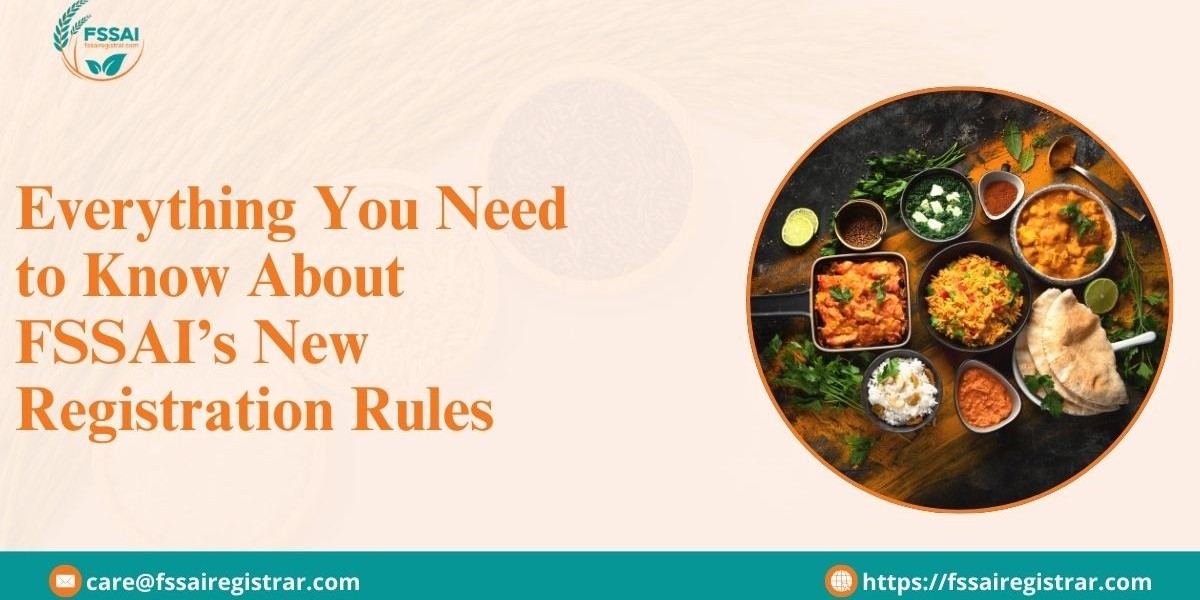Introduction
In recent years, food safety has become a growing concern globally. As India's food and beverage sector expands rapidly, ensuring businesses adhere to health and safety standards is crucial. The FSSAI Registration process plays a vital role in regulating food safety laws and ensuring businesses maintain proper hygiene and quality standards. Recently, FSSAI has introduced new registration rules to streamline the process, enhance food safety, and make it easier for businesses to operate legally. These updated regulations are designed to help small, medium, and large food businesses comply with necessary guidelines while upholding food safety practices.
Why Are the New FSSAI Registration Rules Important?
The new rules introduced by FSSAI are aimed at simplifying and improving the registration process for food businesses. The changes will impact the application procedures, fee structure, and compliance requirements for food businesses of all sizes.
The key benefits of the new FSSAI registration rules are:
Simplified Registration Process: The process has become more transparent and straightforward, reducing the paperwork and time involved in getting registered.
Stricter Food Safety Standards: New rules aim to ensure better monitoring and enforcement of food safety practices.
Improved Customer Trust: The changes will help ensure that businesses are more transparent and consumers are guaranteed safe and quality food products.
Boosting the Food Industry: By providing easier access to registration and licensing, FSSAI aims to encourage the growth of small and medium-sized food enterprises.
Key Changes in FSSAI’s New Registration Rules
1. Introduction of New Categories for Food Businesses
Under the new rules, FSSAI has introduced more specific categories for food businesses based on the type, scale, and scope of operations. These categories make it easier for businesses to apply for the correct type of license or registration, based on their business needs. The primary categories are:
FSSAI Registration: This applies to small food businesses with an annual turnover of less than ₹12 lakhs. This category includes small retailers, food vendors, and home-based food businesses.
FSSAI State License: This applies to medium-sized food businesses with an annual turnover between ₹12 lakhs and ₹20 crores. This license applies to businesses like small manufacturers, caterers, and local restaurants.
FSSAI Central License: This is required for large food businesses with an annual turnover above ₹20 crores or for businesses involved in food export/import. This is typically applicable to large manufacturers, food processors, and multi-location food service providers.
The differentiation in categories ensures that the registration and licensing processes are more relevant and appropriate for businesses of all sizes.
2. New Registration Timeline
Previously, businesses could wait several weeks for their FSSAI registration to be processed. However, with the new rules, FSSAI has introduced a more streamlined approach to processing registrations:
FSSAI Registration: For small businesses, the registration is now processed faster, often within 7-10 working days.
FSSAI State and Central Licenses: For medium and large businesses, the processing time has also been reduced, generally taking around 15-30 working days depending on the complexity of the application.
This shortened processing timeline allows businesses to get their operations up and running quickly while ensuring compliance with the necessary food safety standards.
3. Simplified Application Procedure
The new rules have introduced a more user-friendly application procedure for obtaining FSSAI registration or licenses. The process now takes place entirely online, with businesses required to apply through the official Food Licensing and Registration System (FLRS) portal. Here’s a quick overview of the simplified application steps:
Access the FSSAI Registration Portal – Visit the official FSSAI website to begin the process.
Complete the Application Form – Provide your name, business information, food category, and upload your PAN card.
Review the Details – Double-check all the information entered and ensure everything is correct before submission.
Make the Payment – Pay the necessary fee online, based on your license category.
Enter OTP – Verify your identity by entering the OTP sent to your registered mobile number or email address.
Site Inspection (If Applicable) – FSSAI officials may conduct an on-site inspection of your premises for approval.
Obtain the FSSAI License – After approval, download your FSSAI license directly from the portal.
By shifting to a fully digital process, FSSAI has made the application process much easier and faster for food businesses across India.
4. Food Safety and Hygiene Regulations
For FSSAI license applicants, adhering to hygiene and safety protocols is essential. Key compliance aspects include:
Food Safety Management Plans (FSMP): Businesses must implement FSMPs outlining hygiene practices and safety standards.
Traceability: Companies must maintain records of audits, production, and food sourcing.
Regular Inspections: FSSAI will conduct periodic inspections to ensure compliance.
These measures aim to enforce high food safety standards, safeguarding consumer health.
5. Penalties for Non-Compliance
Under the new rules, FSSAI has introduced more stringent penalties for businesses that fail to comply with food safety standards. The penalties may include fines, suspension of registration, or even a complete shutdown of the business in cases of severe violations. Food businesses must adhere to the food safety standards set by FSSAI to avoid these penalties.
Suggested read: FSSAI Licence Registration in India
Conclusion
FSSAI’s new registration rules are a step in the right direction toward ensuring food safety, improving compliance, and enhancing transparency in the food industry. By simplifying the registration process, reducing processing times, and enforcing stricter hygiene standards, FSSAI is working to make the Indian food industry safer and more organized. As a food business owner, it is essential to familiarize yourself with these changes and ensure that you comply with the updated rules. Not only will this help you avoid penalties, but it will also improve your brand’s reputation and consumer trust.









